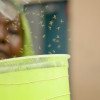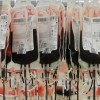Question
Dear Chris, a question from a podcast listener from Rio de Janeiro, Brazil:
Is it theoretically possible that, in the future, a criminal could change his mouth inner layer cells DNA code (from where he knows a sample will be taken), so as not match anymore the code from the hair or blood cells he left on a crime scene?
How about that as an idea for a police story??
Best regards and enthusiastic praises for all your knowledge and your work on science appreciation!!
Ricardo Santiago
Answer
We posed this question to Dr. Paul Debenham Director of Innovation and Development at LGC and Professor Hardev Pandha from the University of Surrey...
Paul - The possibility proposed is of some sort of sci-fi mouthwash which is able to transfer false DNA profile sequences into your mouth cells. To achieve an efficient DNA transfer, one would need to piggyback the DNA profiling sequences into a human virus to achieve infection of the mouth cells. It doesn't sound the sort of treatment many people would volunteer for. This treatment will not destroy the existing person's DNA in their mouth cells, so one would expect to see evidence of a multiple DNA profile and immediately suspect something strange afoot. Current profiling methods can indicate the presence of more than one source of the DNA when the minor component is of the order of a few percent of the major component. There are many technical caveats to that ratio, but that's a ballpark figure that people can work with. If such a mouthwash technique ever became possible, then I could imagine that the sampling procedure deployed would just change to swabbing from a skin surface, plucking out hair roots, or the use of blood, just a pin prick would suffice. Hannah - So, even if any or few percent of your own DNA was left in your cheek, DNA fingerprinting is so sensitive that it would still pick up the real you. But what about grafting tissue containing someone else's DNA onto your inner cheek? We ask Surrey University Oncologist, Professor Hardeev Pandha. Hardeev - If you do that, the take up of the cells is incredibly inefficient. It wouldn't last very long and would most likely be sloughed off or rejected that would be from a different genetic background. So, it's a nice idea but I think this is one that won't be a problem for the police forensics folks. Hannah - So, rather than trying to change your own DNA, we think that a better way to outwit the justice system would be to deluge the crime scene with other people's DNA. For instance, by emptying the contents of a vacuum cleaner bag into the area.










Comments
Add a comment